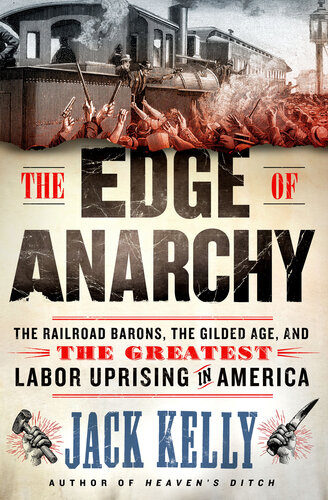
The Edge of Anarchy
The Railroad Barons, the Gilded Age, and the Greatest Labor Uprising in America
کتاب های مرتبط
- اطلاعات
- نقد و بررسی
- دیدگاه کاربران
نقد و بررسی

November 1, 2018
In which the robber barons earn their spurs--and their sobriquets.George Pullman (1831-1897) should be remembered as an innovator in the transportation sector. He was, as Kelly (Heaven's Ditch: God, Gold, and Murder on the Erie Canal, 2016, etc.) writes, an entrepreneur who "knew how to gather resources, command men, and negotiate deals," and even if credit for his long-distance railroad sleeper cars really goes to someone else, Pullman put it all together. At the height of the Gilded Age, he was well on the way to holding a monopoly, carving up the sector with other moguls. Put supply, demand, and sole ownership together, and you have a recipe for suppressed wages and labor unrest, personified here by firebrand organizer Eugene Debs, who called a strike when an economic recession shook the railroad industry, causing wages to fall. The railroad barons were quick to call on a reluctant President Grover Cleveland to intervene, while Debs scored early victories in the negotiations, and Pullman, who "had successfully fought against unions during his entire career," found himself confronting a powerful movement to organize. As Kelly notes, there were many flashpoints during the unrest, as when strikes stranded trains in midcourse and "women and children were left for up to twenty hours with no water or food." Debs renounced violence, but episodes of violence followed, most at the hands of law enforcement and the military. There are memorable moments throughout this fluid account, as when stock in the railyards of Chicago goes up in a wall of flames before which were, as one contemporary report put it, "men and women dancing with frenzy." In the end, the strikes broken, workers' families starved, Pullman refused to reduce his own salary: " 'We cannot, ' Pullman murmured, 'do everything at once.' " He remained rich, but he is not well-remembered today, while Progressive Era reforms soon followed to reduce the barons' power.Kelly's vigorous narrative serves well to set down the facts of a turbulent, little-known history.
COPYRIGHT(2018) Kirkus Reviews, ALL RIGHTS RESERVED.

Starred review from November 1, 2018
In 1894, workers at the Pullman Palace Car Company near Chicago went on strike against their powerful employer, George Pullman. This set off the greatest labor action in U.S. history, one that threatened a true national strike. Kelly explores this event in all its conflict and confrontation. Workers, led by the indomitable Eugene V. Debs, rebelled against a company that had dictated their living conditions as well as their working conditions. George Pullman really believed he was a model employer, but he would not respond to workers' grievances. Unrest spread from Chicago across the nation, particularly into California. Realizing the threat this posed to the economy if not the body politic itself, President Cleveland called out troops against the counsel of Illinois governor John Peter Altgeld. Yet even army troops' loyalty was tested when they were asked to fire on their fellow countrymen. The strike may have failed and Debs was jailed, but legislation followed that protected worker rights. Kelly vividly portrays the personalities involved, from elected officials to labor leaders, and makes the tensions of the time quite contemporary.(Reprinted with permission of Booklist, copyright 2018, American Library Association.)

























دیدگاه کاربران